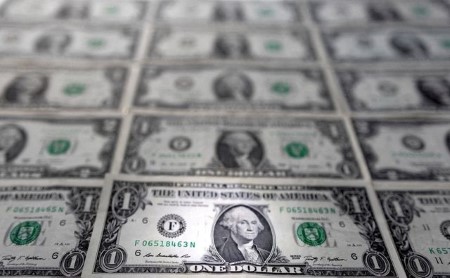




Policy Rate Updates: BSP outlook — cloudy with a chance of rate cut
 DOWNLOAD
DOWNLOAD

January Economic Update: Growth slows, prices rise
 DOWNLOAD
DOWNLOAD

Inflation Update: Up, up, and away?
 DOWNLOAD
DOWNLOAD


Safe haven dollar stands tall on inflation, energy jitters

HONG KONG, July 11 (Reuters) – The dollar was on the front foot at the start of a week in which US and Chinese data and European energy security were top of mind, as investor concerns about global economic growth offered support to the safe haven currency.
The euro languished at USD 1.01475, having lost 2.3% last week and briefly falling to its lowest since late 2002.
The greenback gained 0.37% on the yen to 136.63 in early trade, not far from a 20-year peak hit last month, leaving the dollar index at 107.29.
“The (dollar) could remain expensive until the risks around elevated global inflation, European energy security and China’s growth outlook have been resolved,” said analysts at Barclays in a note to clients.
“This week’s US CPI will be an important piece of the puzzle as the Fed decides between 50 basis points and 75 basis points ahead of the July meeting.”
The data is due Wednesday and markets would likely interpret a high reading as a sign the US Federal Reserve would need to raise rates even more aggressively to combat inflation.
With inflation rampant across much of the world, rate hikes are also expected this week from the Reserve Bank of New Zealand on Tuesday and the Bank of Canada on Thursday.
Energy concerns meant the euro was struggling against more than just the dollar and in early trade Monday was at 0.85 British pence and 138.48 yen, just above last Friday’s levels when it hit its lowest since late May against both currencies.
In the latest worry for the European economy, the biggest single pipeline carrying Russian gas to Germany starts annual maintenance on Monday. Flows are expected to stop for 10 days, but governments, markets and companies fear the shut-down might be extended due to war in Ukraine.
The other main economic event this week is Chinese second quarter GDP on Friday, with investors watching for signs of how hard the economy was hit by COVID-19 lockdowns in many cities during the quarter.
Case numbers are edging up slightly again in Shanghai, though much lower than they were, and authorities there and in several cities are scrambling to stamp out new outbreaks.
Britain will publish its second quarter GDP data on Wednesday, but attention is more focused on the ruling Conservative party’s choice of their next leader and prime minister, as candidates throw their hats into the ring, with many promising tax cuts.
Sterling was steady at USD 1.2028 on Monday morning, having finished a volatile time last week not far from where it started.
Bitcoin BTC=BTSP was at USD 20,800 after its latest attempt to break significantly away from around USD 20,000 petered out over the weekend. It has been stuck at around that level for the past month.
(Reporting by Alun John; Editing by Sam Holmes)
This article originally appeared on reuters.com





 By Reuters
By Reuters